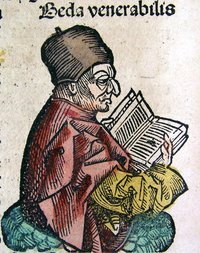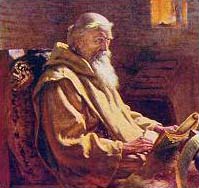Bede
|
|
Bede (Latin Beda), also known as Saint Bede or, more commonly, the Venerable Bede (c. 672 – May 25, 735), was a monk at the Northumbrian monastery of Saint Peter at Wearmouth (today part of Sunderland), and of its companion monastery, Saint Paul's, in modern Jarrow. He is well known as an author and scholar, whose best-known work is Historia ecclesiastica gentis Anglorum (The Ecclesiastical History of the English People) gained him the title "The father of English History". Bede wrote on many other topics, from music and metrics to scripture commentaries.
| Contents |
Life
Almost all that is known of his life is contained in a notice added by himself to his Historia (v. 24), which states that he was placed in the monastery at Wearmouth at the age of seven, that he became deacon in his nineteenth year, and priest in his thirtieth, remaining a priest for the rest of his life. It is not clear if he was of noble birth or not. He was trained by the abbots Benedict Biscop and Ceolfrid, and probably accompanied the latter to Jarrow in 682. There he spent his life, finding his chief pleasure in being always occupied in learning, teaching, or writing, and zealous in the performance of monastic duties. There likewise he died and was buried, but his bones were, towards the beginning of the 11th century, removed to Durham.
Bede became known as Venerable Bede soon after his death, but this was not linked to consideration for sainthood by the Roman Catholic Church. His scholarship and importance to Catholicism were recognised in 1899 when he was declared a Doctor of the Church as St Bede The Venerable.
Work
His works show that he had at his command all the learning of his time. It was thought that the library at Wearmouth-Jarrow was between 300-500 books, making it one of the largest in England. It is clear that Biscop made strenuous efforts to collect books on his extensive travels. Bede was proficient in patristic literature, and quotes Pliny the Younger, Vergil, Lucretius, Ovid, Horace, and other classical writers, but with some disapproval. He knew some Greek but no Hebrew. His Latin is generally clear and without affectation, and he is a skilful story-teller. However, his style can be considerably more obscure in his Biblical commentaries.
Bede practiced the allegorical method of interpretation, and was by modern standards credulous concerning the miraculous; but in most things his good sense is conspicuous, and his kindly and broad sympathies, his love of truth and fairness, his unfeigned piety, and his devotion to the service of others combine to make him an exceedingly attractive character.
Bede's writings are classed as scientific, historical, and theological. The scientific include treatises on grammar (written for his pupils), a work on natural phenomena (De rerum natura), and two on chronology (De temporibus and De temporum ratione). Bede made a new calculation of the age of the earth and began the practice of dividing the Christian era into BC and AD. Interestingly, Bede wrote that the Earth was round "like a playground ball", contrasting that with being "round like a shield".
Historia Ecclesiastica
The most important and best known of his works is the Historia ecclesiastica gentis Anglorum, giving in five books (about 400 pages) the history of England, ecclesiastical and political, from the time of Caesar to the date of its completion (731). The first twenty-one chapters, treating of the period before the mission of Augustine, are compiled from earlier writers such as Orosius, Gildas, Prosper of Aquitaine, the letters of Pope Gregory I, and others, with the insertion of legends and traditions.
After 596, documentary sources, which Bede took pains to obtain, are used, as well as oral testimony, which he employed with critical consideration of its value. He cited his references and was very concerned about sources of all his sources, which created an important historical chain. He is credited with inventing footnoting. (Due to his innovations like footnoting he was accused of heresy at the table of Bishop Wilfred, although the actual accusation was for miscalculating the age of the world, his chronology being contrary to the calculation of the time. The controversy is linked to footnoting because Bede cited another source in a note, rather than opining himself; others misunderstood the significance of citing another source.)
Other Historical and Theological Works
His re-editing of the Vulgate Bible was of immense importance, and was the official version of the Bible for the whole of Western Christendom until the Reformation, and was used by the Catholic church until 1966. Rather than copying from any one source, he researched from several sources to create single volume bibles, a practice which was highly unusual for the time: previously, the bible had circulated as separate books. Arguably this work of Bede has had a much greater and wider influence than his History of the British People. He also worked on translations of parts of the Bible into old English, unfortunately these have not survived.His other historical works included lives of the abbots of Wearmouth and Jarrow, as well as lives in verse and prose of St. Cuthbert of Lindisfarne. The most numerous of his writings are theological, and consist of commentaries on the books of the Old and New Testaments, homilies, and treatises on detached portions of Scripture.
His last works, completed on his death-bed, were a translation into Old English of the Gospel of John, and, perhaps, a vernacular poem on the final judgement.
Vernacular Poetry
According to his disciple Cuthbert, Bede was also doctus in nostris carminibus ("learned in our song"). Cuthbert's letter on Bede's death, the Epistola Cuthberti de obitu Bedae, moreover, commonly is understood to indicate that Bede also composed a five line vernacular poem known to modern scholars as Bede’s Death Song (text and translation Colgrave and Mynors 1969):
- Canebat autem sententiam sancti Pauli apostoli dicentis “Horrendum est incidere in manus Dei uiuentis,” et multa alia de sancta scriptura, in quibus nos a somno animae exurgere praecogitando ultimam horam admonebat. In nostra quoque lingua, ut erat doctus in nostris carminibus, dicens de terribili exitu animarum e corpore:
- Fore ðæm nedfere nænig wiorðe
- ðonc snottora ðon him ðearf siæ
- to ymbhycgenne ær his hinionge
- hwæt his gastæ godes oððe yfles
- æfter deað dæge doemed wiorðe.
- And he used to repeat that sentence from St. Paul “It is a fearful thing to fall into the hands of the living God,” and many other verses of Scripture, urging us thereby to awake from the slumber of the soul by thinking in good time of our last hour. And in our own language,—for he was familiar with English poetry,—speaking of the soul’s dread departure from the body:
- Facing that enforced journey, no man can be
- More prudent than he has good call to be,
- If he consider, before his going hence,
- What for his spirit of good hap or of evil
- After his day of death shall be determined.
As Opland notes, however, it is not entirely clear that Cuthbert is attributing this text to Bede: most manuscripts of the letter do not use a finite verb to describe Bede’s presentation of the song, and the theme was relatively common in Old English and Anglo-Latin literature. The fact that Cuthbert’s description places the performance of the Old English poem in the context of a series of quoted passages from sacred scripture, indeed, might be taken as evidence simply that Bede also cited analogous vernacular texts (see Opland 1980, 140-141). On the other hand, the inclusion of the Old English text of the poem in Cuthbert’s Latin letter, the observation that Bede “was learned in our song,” and the fact that Bede composed a Latin poem on the same subject all seem to suggest that his connection to the vernacular poem was stronger than mere quotation. By citing the poem directly, Cuthbert seems to be implying that its specific wording was in some way important, either as a vernacular poem endorsed by a scholar who generally appears to have frowned upon secular entertainment (see McCready 1994, esp. 14-19) or as a direct quotation of Bede’s final original composition (see Opland 1980, 140-141, for a discussion of some of the implications of this passage).
References
Colgrave, Bertram and R.A.B. Mynors, eds. Bede's Ecclesiastical History of the English People (Oxford, 1969).
McCready, William D. Miracles and the Venerable Bede. Studies and Texts: Studies and Texts (Pontifical Institute of Mediaeval Studies), 118 (Toronto: Pontifical Institute of Mediaeval Studies, 1994).
Opland, Jeff Anglo-Saxon Oral Poetry: A Study of the Traditions (New Haven and London, 1980).
See also
External links
- Ecclesiastical History of the English People (http://www.fordham.edu/halsall/basis/bede-book1.html), Book 1, L.C. Jane's 1903 Temple Classics translation. From the Internet Medieval Sourcebook.
- Bede's World: the museum of early medieval Northumbria at Jarrow (http://www.bedesworld.co.uk/)
- Bede’s Ecclesiastical History (http://www.bartleby.com/211/0506.html) commentary from The Cambridge History of English and American Literature, Volume I, 1907–21.
This article includes content derived from the public domain Schaff-Herzog Encyclopedia of Religious Knowledge, 1914.bg:Беда Преподобни de:Beda Venerabilis fr:Bède le Vénérable la:Beda nl:Beda no:Beda den ærverdige pl:Czcigodny Beda it:San Beda il Venerabile sv:Beda venerabilis


